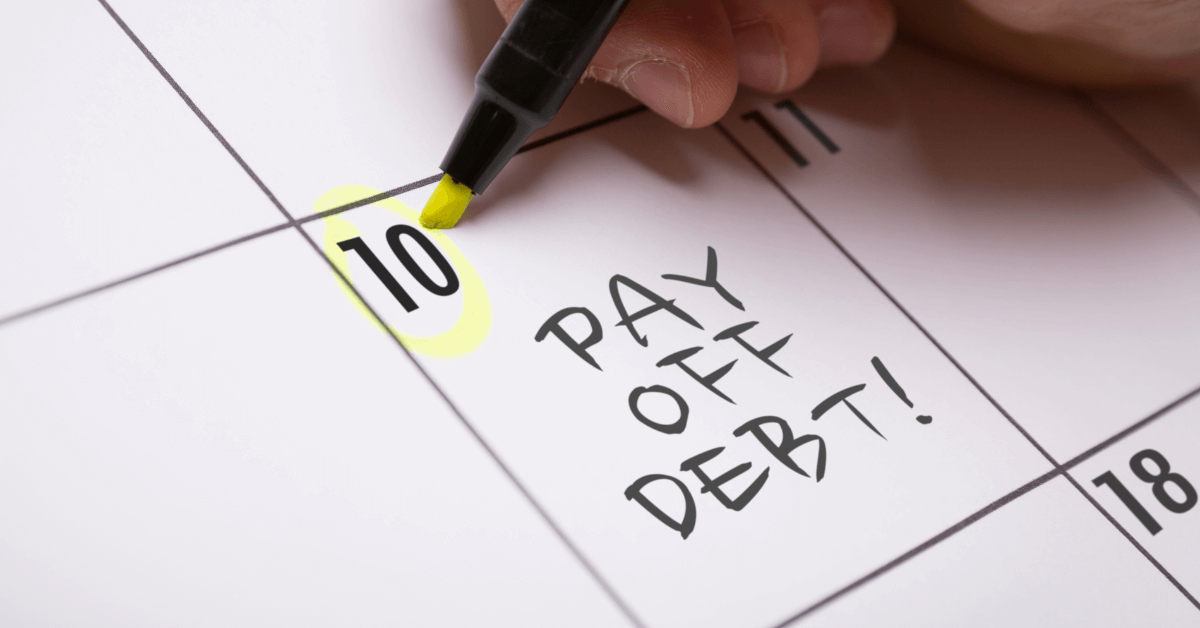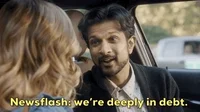10 Strategies to pay off debt fast

Many people just pay the minimum amount to pay off debt because it is easier. However, it is not always the best solution in the long run.
According to the Peter G Peterson Foundation, the US has accumulated more than 9 trillion dollars in debt over the past ten years.

There are several reasons why it is hard for people to overcome their debt. Life gets in the way and forces us to stick to making minimum payments. However, there are options even when it seems impossible.
Here are 10 strategies that help you pay off debt faster,
- Create a budget
- Increase your income
- Pay more than just the minimum amount
- Prioritize your debt
- Keep track of your spending
- Consider debt settlement
- Have an end goal
- Prioritize your needs vs your wants
- Save by canceling subscriptions
- Seek help from financial experts!
Keep reading to find out how these 10 strategies may help you pay off your debt faster and save you more money in the long run!
1. Create a budget
If you’re like most people, the word “budget” probably doesn’t bring to mind visions of financial freedom and abundance. But creating a budget doesn’t have to be a dreaded chore. In fact, with a little planning and effort, it can be surprisingly easy to stick to a budget and free up more money for your priorities.
The first step
Figure out where your money is going. Track your spending for at least one month, or better yet, three months.
This will give you a good idea of your typical spending patterns. Once you know where your money is going, you can start to make some cuts.
Do you really need that expensive coffee every morning? Can you brown-bag your lunch instead of eating out? Are there any subscription services or memberships that you can do without?
Next,
Set some financial goals.
What do you want to save for? A down payment on a house? A new car? A rainy day fund?
Once you have a goal in mind, you can start working backward to figure out how much you need to save each month. Automating your savings can help make it easier to reach your goal, and there are plenty of apps and platforms that make it easy to get
2. Increase your income
Increasing your income can be difficult especially when you are already working that full-time 9-5 job. Everyone’s financial situation is unique, so there is no one-size-fits-all answer when it comes to increasing your income.
However, there are a few general strategies that can help you boost your earnings.
- One option is to ask for a raise at your current job. If you have been consistently performing well and contributing to your company’s success, then it is likely that your employer will be willing to give you a raise.
- Another option is to look for a new job that pays more than your current one. This can be a daunting task, but there are a number of resources that can help you find the right opportunity.
- Finally, you may also want to consider starting your own business. This can be a riskier option, but it also has the potential to provide a much higher return on investment.
Whichever route you decide to take, remember that increasing your income is an important step in achieving financial security.
3. Pay more than just the minimum amount
Most people who have credit card debt only make the minimum payment each month. This is understandable, as it can be difficult to come up with more money when you’re already struggling to make ends meet.
However, there are good reasons to pay more than just the minimum amount.
For one thing, it will help you to pay off your debt more quickly. The more you pay each month, the less interest you’ll accrue, and the faster you’ll be able to reach your goal.
In addition, making more than the minimum payment can help improve your credit score. Credit scoring models take into account how much of your credit limit you’re using, and paying down your balance will lower your credit utilization ratio.
As a result, paying more than the minimum can save you money in the long run and help you to improve your financial situation.
4. Prioritize your debt
If you find yourself buried in debt, it can be difficult to know where to start in terms of getting out.
Some people recommend paying off the debt with the highest interest rate first, as this will save you the most money in the long run.
Others recommend starting with the smallest debt first, as this can give you a quick win and boost your motivation to keep going.
Ultimately, there is no right or wrong answer when it comes to which debt to pay off first. The most important thing is to develop a plan and stick to it.
If you have multiple debts with high-interest rates, you may want to focus on paying those down first. Or, if you have a smaller debt that you feel you can quickly pay off, that may be a good place to start.
Whichever approach you take, the key is to be patient and disciplined in your repayment plan. Make sure to consult a financial expert if you are not sure how to prioritize your debt!
5. Keep track of your spending
It’s important to keep track of your spending for a variety of reasons.
- First, it can help you to stick to a budget and avoid overspending.
- Second, it can help you to identify areas where you can save money.
- Third, it can help you to spot potential problem areas, such as credit card debt or impulse buying.
- Finally, keeping track of your spending can simply give you a better understanding of where your money goes each month.
There are a number of different ways to keep track of your spending. You can use a budgeting app, create a spreadsheet, or simply write out your expenditures in a notebook.
The key is to find a method that works for you and that you will actually stick with. Once you start tracking your spending, you may be surprised by how much money you waste on things that you don’t really need.
By becoming more aware of your spending patterns, you can make changes that will save you money in the long run.
6. Consider debt settlement
Before considering debt settlement, it’s important to understand how the process works.
When you settle a debt, you agree to pay the creditor a lump sum that is less than the full amount you owe. In exchange, the creditor agrees to forgive the rest of the debt.
For example, if you owe $10,000 and you settle the debt for $5,000, the creditor will forgive the remaining $5,000.
Debt settlement can be a helpful way to reduce your debt, but it’s important to be aware of the potential risks.
- First of all, settling debt will have a negative impact on your credit score.
- Additionally, you may be required to pay taxes on the amount of debt that is forgiven.
- Finally, there is no guarantee that your creditor will agree to settle your debt.
If you’re considering debt settlement, it’s important to weigh the pros and cons carefully before making a decision.
7. Have an end goal
Yes, having an end goal is very important when paying off your debt. Creating a goal gives you the motivation to pay off your debt faster because it gives you something to look forward to.
Maybe your goal is to take a vacation, finally, get your credit score up so you can buy that new car, or maybe it’s just to get your control back overall.
Whatever the reason may be, make sure to create a realistic end goal to help keep you motivated!
8. Prioritize your needs vs wants
This strategy can help you pay off your debt faster by controlling how much you spend on things you don’t need.
It can be hard to cut back on spending, especially when it is the one thing that makes you feel better when you are having a bad day.
You don’t have to cut back completely, just be more mindful of what you need vs what you want when you are out shopping. Before you checkout ask yourself if what you have in the cart is a need or a want. Maybe even limit yourself to one “want” item each time you go shopping.
9. Save by canceling subscriptions
These days, it seems like there’s a subscription for everything, from streaming services to food delivery to workout apps. And while these subscriptions can be convenient, they can also add up quickly.
If you’re looking to save some money, one easy place to start is by canceling any subscriptions that you no longer use.
For example, if you’ve stopped going to the gym, there’s no need to keep paying for a workout app that you’re not using. Or if you found that you were watching the same few shows on Netflix, you could cancel your subscription and just rent or buy those shows instead.
By taking a close look at your subscription payments, you may be surprised at how much money you could save by canceling just a few unnecessary subscriptions.
10. Seek help from financial experts
Overall paying off debt can be hard and seem impossible at times. If you are struggling to manage your debt it might be time to ask a financial expert for help. Find out all of your options, you might even qualify for debt relief programs!
Schedule a free consultation with one of our financial experts to help you find out your debt relief options now! Find your savings with Roundleaf Inc.
